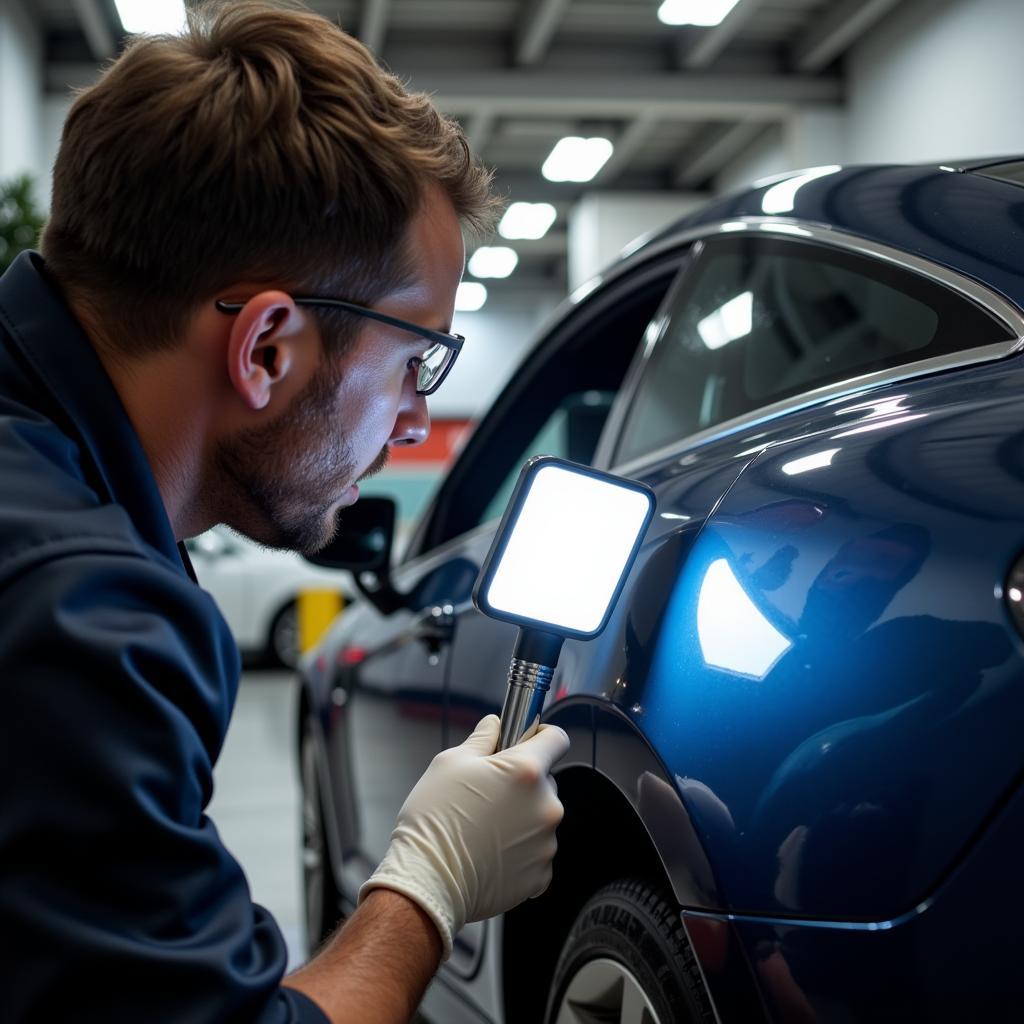Detailing a car goes far beyond a simple wash and wax. It’s a meticulous process of reconditioning and protecting every surface of a vehicle, both inside and out, to restore it to a like-new or even better-than-new condition. It involves a combination of cleaning, polishing, and protecting techniques designed to enhance the vehicle’s aesthetic appeal and preserve its value. But what exactly does “detail a car” mean in practice?
What Does it Mean to Detail a Car?
Detailing a car involves a comprehensive, multi-stage process that addresses every aspect of the vehicle’s appearance and condition. This includes cleaning, correcting paint imperfections, restoring faded trim, and protecting all surfaces. It’s not just about making your car look shiny; it’s about enhancing its overall appearance and preserving its condition for years to come. Think of it as a spa day for your car, where every inch is pampered and rejuvenated. The aim is to achieve a level of cleanliness and finish far exceeding a standard car wash. Similar to detailed car meaning, the process requires specialized tools, products, and knowledge.
Exterior Detailing: A Deep Dive
Exterior detailing focuses on enhancing the appearance and protection of the car’s exterior surfaces. This includes the paint, glass, wheels, tires, and trim. The process often begins with a thorough wash to remove loose dirt and grime, followed by decontamination to remove embedded contaminants like iron particles and tar. This prepares the surface for polishing, which corrects paint imperfections like swirl marks and scratches. Finally, a protective layer of sealant or wax is applied to shield the paint from the elements and maintain its shine. This is far more in-depth than a standard car wash and requires specialized tools and products. For example, clay bars are used for decontamination, and orbital polishers are utilized for paint correction.
Interior Detailing: Beyond a Simple Vacuum
Interior detailing involves a thorough cleaning and restoration of the car’s interior. This encompasses vacuuming, shampooing carpets and upholstery, cleaning and conditioning leather, and detailing all interior surfaces including the dashboard, door panels, and center console. Special attention is paid to removing stains, eliminating odors, and restoring the original appearance of the materials. It’s not just about making the interior look clean but also creating a healthy and pleasant environment inside the vehicle. This requires using specialized cleaning products and techniques to avoid damaging delicate surfaces.
Why Detail a Car?
The benefits of detailing a car extend beyond aesthetics. Regular detailing can significantly enhance the vehicle’s resale value. A well-maintained car demonstrates care and attention to detail, which can be a significant selling point for potential buyers. It’s similar to detail cars meaning in its focus on enhancing the vehicle’s overall presentation and value. Moreover, detailing helps protect the car from environmental factors like UV rays, acid rain, and road grime, which can damage the paint and other surfaces over time. Detailing cars involves restoring them to their optimal condition.
Preserving Your Investment: The Long-Term Benefits
Detailing can be seen as an investment in your vehicle’s longevity. By protecting the paint and other surfaces, detailing helps prevent premature wear and tear, extending the lifespan of the vehicle. This resonates with the idea of care for details meaning, which emphasizes meticulous attention to preserving and enhancing value. It’s a proactive approach to car maintenance that pays off in the long run. A well-detailed car is less susceptible to rust and corrosion, further preserving its structural integrity.
How Often Should You Detail Your Car?
The frequency of detailing depends on several factors, including the vehicle’s usage, storage conditions, and the owner’s preferences. As a general guideline, detailing a car every six months is recommended for maintaining its optimal condition. However, vehicles exposed to harsh weather conditions or frequent off-road driving may benefit from more frequent detailing. Just like detailing car meaning encompasses various maintenance aspects, the frequency should be tailored to the individual vehicle’s needs. Consulting with a professional detailer can help determine the best detailing schedule for your specific situation.
 Professional Car Detailer Inspecting Paint
Professional Car Detailer Inspecting Paint
Conclusion
Detailing a car is much more than just a car wash; it’s a comprehensive process of restoring and protecting a vehicle, inside and out, to achieve a pristine finish and maintain its value. Understanding the true meaning of “detail a car” involves recognizing the meticulous approach, specialized techniques, and long-term benefits it offers. Regular detailing not only enhances the aesthetic appeal of your vehicle but also protects your investment and contributes to its longevity.
FAQs
- What is the difference between a car wash and car detailing?
- How much does car detailing cost?
- What are the essential tools for car detailing?
- Can I detail my car myself?
- What are the different types of car waxes and sealants?
- How long does car detailing take?
- What are the benefits of ceramic coating?
Need assistance with car detailing or have further questions? Contact us via WhatsApp: +1(641)206-8880, Email: [email protected]. Our 24/7 customer support team is ready to assist you.

Leave a Reply